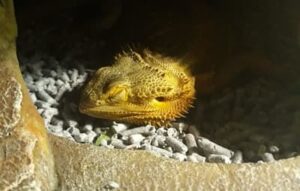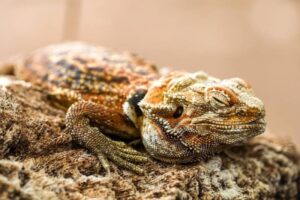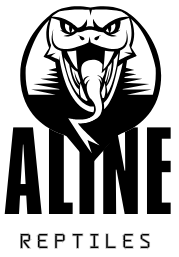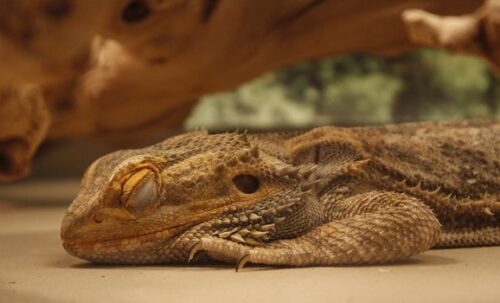If you’re a proud bearded dragon owner, you’ve probably marveled at their quirky behaviors. But when your usually active and curious dragon suddenly starts sleeping more than usual, it’s natural to wonder, Why is my bearded dragon sleeping so much? Is it brumation? A health concern? Or something in their environment? Understanding the reasons behind this behavior is key to ensuring your dragon’s well-being.
In this guide, we’ll explore the possible explanations for your bearded dragon’s increased sleepiness, from natural seasonal changes like brumation to potential health issues. We’ll also provide actionable tips and highlight red flags to help you keep your scaly companion happy, healthy, and alert.
Is It Normal for Bearded Dragons to Sleep a Lot?

Bearded dragons are diurnal creatures, meaning they’re active during the day and sleep at night. On average, a healthy adult bearded dragon sleeps 8–12 hours at night. However, if they’re dozing off during the day or seem lethargic, it could be a sign of an underlying issue.
Normal Sleep Patterns
| Life Stage | Expected Sleep Duration |
|---|---|
| Hatchlings/Juveniles | 10–12 hours (with bursts of activity) |
| Adults | 8–12 hours (mostly at night) |
| Seniors (7+ years) | 10–14 hours (may nap more during the day) |
Key Tip: Monitor your dragon’s sleep habits regularly. A small change might not be a concern, but significant deviations warrant investigation.
Potential Causes of Excessive Sleeping
Understanding the cause behind your bearded dragon’s sleepiness is the first step toward addressing it. Here are the main factors to consider:
a. Seasonal Behavior: Brumation
Brumation is a natural hibernation-like state that occurs during cooler months. During brumation, your dragon’s activity level drops significantly, and they may sleep for extended periods.
Signs of Brumation:
- Decreased appetite.
- Spending more time hiding or burrowed.
- Lethargy but no signs of illness (e.g., weight loss, labored breathing).
What You Can Do:
- Ensure the tank’s temperature aligns with brumation needs (cooler but not too cold).
- Provide access to water to prevent dehydration.
- Avoid force-feeding unless recommended by a vet.
Pro Tip: Not all bearded dragons brumate! Some may skip brumation entirely, especially in captivity with consistent lighting and temperatures.
b. Environmental Factors
Bearded dragons are highly sensitive to their environment. Poor lighting, incorrect temperatures, or improper humidity can make them lethargic.
Checklist for Ideal Tank Conditions:
| Parameter | Ideal Range |
|---|---|
| Basking Temperature | 95–110°F (35–43°C) |
| Cool Side Temp. | 75–85°F (24–29°C) |
| UVB Lighting | 10–12 hours daily |
| Humidity Level | 30–40% |
Common Environmental Problems:
- Insufficient UVB lighting: UVB is crucial for calcium absorption and energy. Without it, your dragon may become lethargic or develop metabolic bone disease.
- Improper temperature gradients: Too cold, and they can’t digest food properly. Too hot, and they might retreat to hide all day.
- Excessive humidity: Can lead to respiratory issues.
c. Diet and Nutrition
Bearded dragons require a well-balanced diet to stay healthy. A poor diet can cause lethargy or excessive sleeping.
Diet Breakdown by Life Stage:
| Life Stage | Diet Composition |
|---|---|
| Hatchlings | 80% insects, 20% vegetables |
| Juveniles | 60% insects, 40% vegetables |
| Adults | 20% insects, 80% vegetables |
Signs of Dietary Issues:
- Lack of appetite.
- Weight loss or gain.
- Fatigue after meals.
Solution:
- Provide a variety of fresh greens (e.g., collard greens, mustard greens) and gut-loaded insects (e.g., crickets, dubia roaches).
- Avoid feeding spinach, iceberg lettuce, or citrus fruits.
d. Stress or Mental Well-being
Bearded dragons can experience stress due to changes in their routine, loud noises, or poor tank setups. Stress can cause them to withdraw and sleep more.
Common Stressors:
- New tank mates.
- Frequent handling.
- Relocation or new surroundings.
How to Reduce Stress:
- Create a safe and stable environment.
- Provide hiding spots like caves or logs.
- Limit handling to short, calm sessions.
e. Illness or Health Issues
Excessive sleeping could indicate an underlying health problem. Some common illnesses include:
- Parasites: Internal parasites can drain energy and cause fatigue.
- Respiratory infections: Often caused by high humidity or cold temperatures.
- Metabolic Bone Disease (MBD): Caused by insufficient UVB or calcium.
Symptoms to Watch For:
- Weight loss.
- Swollen or soft limbs.
- Mucus around the nose or mouth.
If you notice these signs, consult a reptile veterinarian immediately.
f. Age-Related Factors
As bearded dragons age, their energy levels naturally decline. Senior dragons (7+ years) may sleep more, even during the day, and require less frequent feeding.
How to Address Excessive Sleeping in Bearded Dragons

a. Evaluate the Environment
Start with a thorough check of your dragon’s tank setup. Use the checklist above to ensure proper lighting, heating, and humidity. Replace UVB bulbs every 6–12 months, even if they appear functional.
b. Optimize Diet
- Introduce variety in their diet to prevent nutritional deficiencies.
- Dust insects with calcium powder (without vitamin D3 if they have UVB lighting).
c. Reduce Stress
- Avoid sudden changes in routine.
- Observe their interactions with tank mates to rule out bullying or dominance issues.
d. Monitor for Illness
- Weigh your dragon weekly to monitor for sudden weight loss.
- Look for physical abnormalities such as discoloration, swelling, or labored breathing.
e. Support Brumation
If brumation is the cause, let it run its course. Monitor your dragon’s weight and hydration levels, and keep them comfortable.
When to Seek Veterinary Help
Not sure if it’s brumation or illness? Here’s when to consult a vet:
- Persistent lethargy without improvement.
- Refusal to eat for more than two weeks.
- Significant weight loss.
- Labored breathing or visible discomfort.
Preventive Tips to Keep Your Bearded Dragon Healthy and Active
- Lighting: Use timers to maintain consistent light cycles.
- Tank Enrichment: Include climbing branches, basking spots, and tunnels to encourage activity.
- Routine Health Checks: Schedule annual vet visits and monitor their behavior regularly.
Conclusion
It’s natural to wonder, “Why is my bearded dragon sleeping so much?” if you notice a change in their sleep patterns. By understanding their behavior, providing proper care, and addressing potential concerns early, you can ensure your scaly companion stays healthy and content. Sometimes, increased sleep may simply indicate brumation or an adjustment to changes in their environment.
If you found this guide helpful, consider sharing it with other bearded dragon enthusiasts who may have similar concerns. Together, we can help our beloved reptiles live their best lives!

